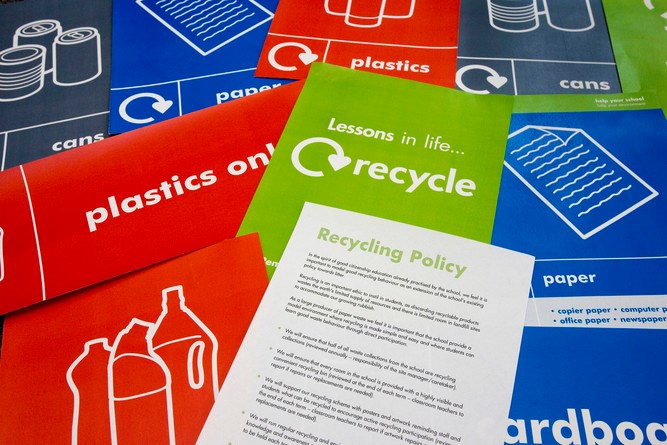
How Wales became a world leader in recycling.
Sut y daeth Cymru yn arweinydd y byd ym maes ailgylchu.
The Welsh Government is working to make Wales a greener, more equal, and more prosperous country. How we manage our waste and the resources we use has become even more crucial; in the growing fight to tackle climate change. Since Wales has had its own government in 1999, we have become a global leader in recycling. We’re now first in the UK, second in Europe and third in the world for household waste recycling. Put simply, recycling is what we do! This achievement has taken a clear, long term vision, strong partnership working, significant investment and clear milestones along the way.
To celebrate Global Recycling Day, we explore how Wales and every household in Wales has helped us achieve this.
1. Set statutory recycling targets.
The Welsh Government set statutory recycling targets with Local Authorities – this has increased household recycling from 5.2% (1998-99) to globally leading figures of 60.7% (2018-19). Municipal waste recycling rates have also risen from 4.8% to 62.8% during the same period.
2. Encouraged greater recycling.
The introduction of a national recycling campaign for Wales, Recycle for Wales, has encouraged consumers to recycle more things, more often from all around the home and other websites like My Recycling Wales provide information on where our recycling goes.
3. Providing over £1 billion since 2000 to help Local Authorities invest in recycling collection services.
Wales has robust collection regimes and we have supported the creation of infrastructure here to deal with our recycling. Thirteen out of 22 local authorities currently follow the Welsh Goverenment’s Collections Blueprint. The Blueprint sets out the recommended method of waste collection, to ensure affordable and sustainable collection services for recyclable, compostable and residual waste.
4. Separate weekly food waste collection.
99% of households now have a food waste collection service after the Welsh Government introduced specific funding to Local Authorities. Our food waste is then processed to create energy to power homes.
5. Improved facilities at waste recycling centres.
Many sites now having handle over 20 different waste streams. Local Authorities in Wales have significantly improved the provision for recycling at their local household waste recycling centres / civic amenity sites. Many now have shops and other enterprises on site which divert materials away from being recycled and allow them to be reused, repaired and sold.
6. Reduction in the frequency of general rubbish collections.
By reducing the amount of general rubbish (black bag) collections, households in Wales have been encouraged to recycle more items
7. Expanded recycling collection service.
Every Local Authority provides a comprehensive recycling collection service. There are items that are consistently collected across the country such as glass, paper, card, metal cans, and plastic bottles, pots, tubs and trays. Wales has led the way in the UK on this.
8. Introduction of electronic and battery recycling.
There are now services in place across Wales to recycle electronic and battery waste. This has increased the overall number of items being recycled.
9. Increase in the number of repair, upcycle and reuse shops.
More and more people now donate furniture, electronic goods and other household items to charities to help fund their operations. Many Local Authorities now operate reuse shops at their recycling centres which means less waste is going to landfill.
10. Increased recycling of mattresses.
Wales leads the way in the UK on the recycling of mattresses with the Welsh Government funding projects like the Rhondda Cynon Taf County Borough Council mattress recycling scheme.
11. Introduced the carrier bag charge.
Wales was the first UK nation to introduce a carrier bag charge, which saw an increase in the number of bags for life used.
But we want to go further, becoming a circular economy and achieving 100% recycling and zero waste by 2050. This is how we will make this ambition a reality.
1. Become a circular economy.
Expand on the success of the plastic bag charge and go beyond recycling and keep resources in use for as long as possible. This will help cut carbon emissions and will help Wales meet this goal as a low carbon economy is a circular economy
2. Ban single-use plasticsThe Welsh Government has proposed restrictions on the use of unnecessary single-use, hard to recycle and commonly littered plastics, as part of wider efforts to tackle the problem of plastic pollution.
3. Embed recycling in the culture of 21st Century Wales
Make recycling what everyone in Wales does whether they live, work or visit! We will emphasize that Wales can’t throw its future away and recycling is necessary to tackle the climate emergency by calling on the Welsh public to Recycle.
ENDS














